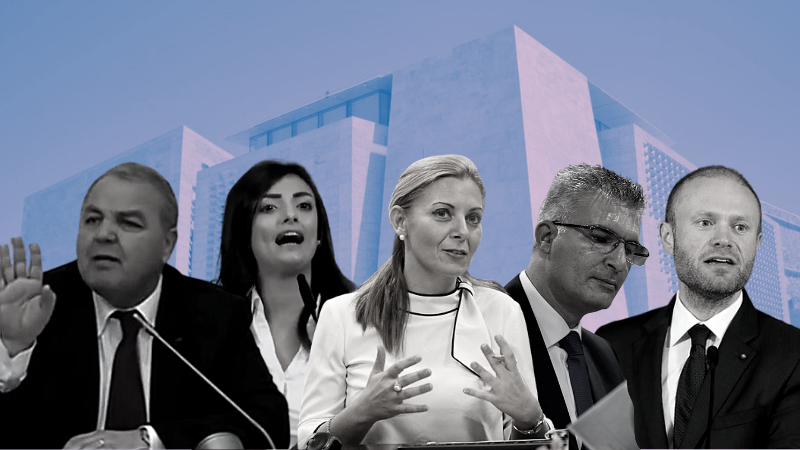If by some unexpected turn of events, the House of Representative’s Standing Committee decides to eventually sanction Education Minister Justyne Caruana, how does it plan to square this with how the government has handled previous ethics breaches by her fellow ministers such as Rosianne Cutajar or Carmelo Abela?
The relatively swift decision by the parliament’s standing committee to publish the Standard Commissioner’s investigation into a €5,000-a-month contract that Caruana handed to Daniel Bogdanovic may appear to be a welcome departure from the usual delays and obfuscations that the discussions of these reports normally involve.
Yet the process between agreeing to publish the report and sanctioning the minister in question can be long and winding, replete with delaying tactics, many of which were used time and again.
When the Commissioner for Standards in Public life finds a there is prima facie evidence of a breach of ethical standards by a public figure to whom Cap. 570 applies, the report is not published but is first submitted to the Speaker of the House for consideration by the above-mentioned committee.
Although this committee is the only one where both sides of the House are represented equally, (in all other committees the government has a majority) it is chaired by the Speaker, Anġlu Farrugia, who holds a casting vote when the two sides disagree, and his record to date remains problematic at best.
Most of Farrugia’s decisions, actions – and inactions – have so far always favoured the transgressing minister, and to date, no member of parliament who the Standards Commissioner found to be in breach of ethical standards has endured any tangible consequence.
Anglu Farrugia’s uninspiring record
The most recent example of the Speaker’s pussyfooting was when Farrugia was tasked with implementing the decision to reprimand Labour MP Rosianne Cutajar.
Cutajar resigned from her role as Parliamentary Secretary pending the outcome of the Standards Commissioner’s investigation and after much stalling and bickering, the committee eventually voted for Cutajar to be reprimanded following the Commissioner’s report detailing her involvement in a €3 million property deal involving Yorgen Fenech and her failure to declare her income from it.
Instead of a stern reprimand, Cutajar received a letter from the Clerk of the House saying that he had been tasked by the Speaker to “inform” the MP of the decision to reprimand her.
Even before that, Farrugia repeatedly delayed his casting vote, and originally voted against the adoption of the commissioner’s report, asking that Cutajar be further investigated before a final decision was to be taken on whether she should face sanctions.
It was also Anġlu Farrugia who, a few months earlier, abstained from casting his deciding vote, effectively stalling the adoption of the Standards Commissioner’s report that had found minister Carmelo Abela to be prima facie in breach of ethical standards after the latter spent €7,000 in taxpayer’s money on promotional adverts.
When the Standards Commissioner found that Joseph Muscat had abused his power as prime minister when he awarded Konrad Mizzi an €80,000-a-year consultancy job just days after Mizzi had resigned, Anġlu Farrugia ruled that since Muscat was no longer an MP, he could not be summoned for questioning and neither could any consequences be dispensed.
Therefore, when former prime minister Joseph Muscat was later found to have once again breached ethical standards by defending members of his staff accused of detaining journalists after a press conference, the Standards Commissioner this time around sought legal advice on Farrugia’s earlier bizarre ruling and, unsurprisingly, the legal counsel found it preposterous.
Lawyer Henri Mizzi told the commissioner that, “even where a person has resigned or otherwise been removed from his position as a person of trust, he may still be investigated by the commissioner for any allegation concerning statutory or ethical breaches that he may have committed during the tenure of his post as a person of trust.” To interpret the law in a contrary sense “would make a mockery of it”.
Yet the Speaker still used his casting vote to rule against the publication of the report.
The committee is set to discuss Caruana’s ethics breach at a later date. When Prime Minister Robert Abela was recently questioned by the press about the report, he said that he will not take any action against Caruana until the parliament’s standards committee has assessed the report’s findings.
Given some of the outcomes of these assessments, Minister Caruana may well find the odds to be in her favour.














What do you expect? That speaker, p.m. and others have taken the road to Damascus & seen the light, nay, a flicker? we can boast that we are a democratic nation run by a legalized mafia. Rest assured that this dirty government and its dirtier members will not be punished or prosecuted … ever (even in the remote chance of a change in government, some sort of accommodation will be found)
It has been like that since at least the mid-1980s
SHAME, SHAME, SHAME – mafia land controlled by corrupt ministers, ex-mininters, people of trust and feudal lords. SHAME
Can the Standards Commissioner investigate the Speaker?